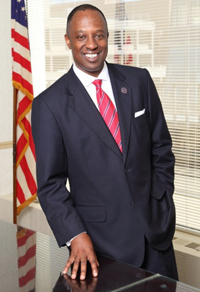
As the nation begins to slowly emerge from quarantine brought on by the COVID-19 pandemic, many remain in shock by the health and economic carnage we are all experiencing. From Wall Street to Main Street, business and financial leaders are stunned by the virus’s impact on nearly every facet of our lives.

No sector of our economy has been disproportionately stymied more than Black-owned businesses from coast to coast.
The COVID-19 economic shutdown has hurt black-owned businesses the most across racial and ethnic groups in the U.S., with a devastating 41 percent decline in black-owned businesses, according to Bloomberg.
The collapse of 440,000 black-owned businesses is a devastating blow to the Black community and a substantial loss for the entire economy. The loss of these businesses coupled with 16.8 percent unemployment of Black Americans is a state of emergency.
In the wake of the pandemic, data revealed what many of us have always known – Black-owned businesses are financially fragile. Most of the businesses are family-owned and regularly confronted with cash flow, operational and legal hurdles that are eating away years of hard work and sacrifice. The challenges faced by Black business owners often mirror those we see in the communities where they are located, hire from and committed to serving.
In addition, like many Black-owned businesses, medical facilities located in minority communities are facing many never-before-seen challenges as well. Since the outbreak, doctors, nurses and other essential workers have been forced to ration care and perform unfamiliar jobs because of staff and equipment shortages. Medical facilities, such as Howard University Hospital in Washington, D.C., and Prince George’s Hospital Center in Maryland, have served Black communities for decades and are vital partners who provide opportunities for small business growth. Workers in these facilities perform heroic duties in unprecedented conditions. They deserve our support, but today are under the threat of over-reaching lawsuits.
Perhaps the most vulnerable health-care sector is nursing homes and long-term health facilities. These facilities, which care for thousands of low-income, aging members of the Black community, were already short on medical supplies and personal protective equipment. They are now struggling to adapt to an ever-changing virus and rising COVID-19 caseloads. These facilities need federal and state funding to help support patients, families, front-line workers, and community partners.
For more than a decade, U.S. Black Chambers has led the fight on Capitol Hill and in corporate board rooms on behalf of the country’s more than 3 million Black-owned businesses. We’re calling on Congress and our corporate partners to do their part in lifting the tide for all Americans, starting with Black Americans, those impacted the most by the pandemic, civil injustices, economic injustices, venture capital discrimination, lending discrimination, and above all, racism; the culprit behind all injustices facing Black Americans.
For informational resources, visit: usblackchambers.org/cares-act
